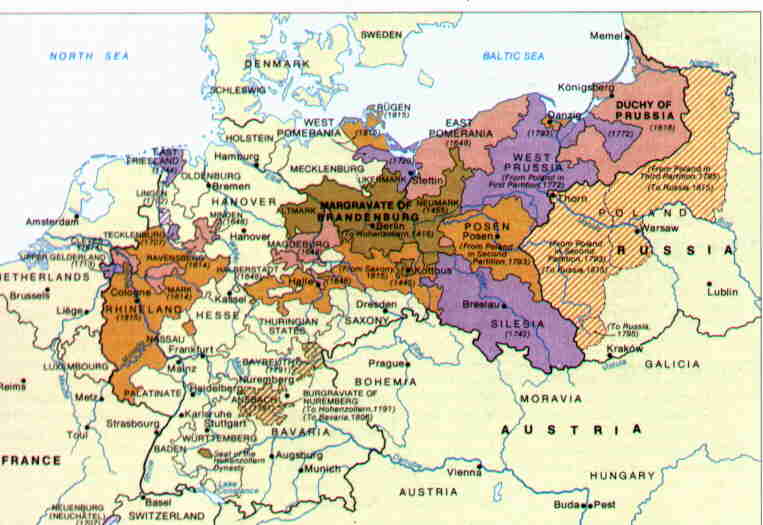In Schulze novel he really shines
light upon the idea that throughout Germany’s history they struggled to form a
national government and remained untied together as separate factions of
Germany. The Germans of the 18th
century did not come together to form a national political union, however they
did begin to advance and become one as a culture. The language that all printers began to write in was that of
German, this is important because although they did not have one central
government they did have one central language. Not having a central government also gave birth to many
scholars and intellectuals, because not many citizens were involved in running
the central government there was a strong importance set on education. From this the German region saw the
formation of many doctors, poets, civil servants, and clergyman, in other words
a more elite group of educated citizens. Also during this time many of the smaller factions during
times of unrest aligned with the two biggest factions in Germany at the time,
Prussia and Austria. “When terms
such as “nation”, “fatherland”, or “patriotism” cropped up, they could refer
equally well to some vaguely defined Germany, to the specific political unit in
which one lived, or both at once” (Schulze 102). This quote really highlights how there was a loss for a
central identity to Germany. The
citizens who lived in the area were loyal to their leaders of their specific
houses. It was only through the development
of the arts, and the educated elite that Germany began to acquire a population
that was more tightly knit.
When
comparing the United States and Germany in the way they were unified there are
many similarities, but also some differences. Both were made up of different colonies, and both managed
themselves separately. For example
New York had different ways of running their colony compared to Virginia. This is the case as well with Prussia
and Austria. However where they
are different is how they unified as a whole. The American colonies came together with one common goal,
and set up a political platform that everyone in America stood for. Germany on the other hand did not have
political issues at the forefront of their unification; rather they used their
culture to form what we know as Germany today. It’s quite ironic as well because in Germany today there is
still great divide between citizens on social issues such as religion. Since the country wasn’t founded on key
principles, and fundamental rights, the emphasis on Germany's cultural
background is highlighted more in the Germany we know today.
Another
key ingredient in the formulation of Germany as a whole was the
industrialization of its society.
Rather than prosper because of political revolution and unique structure
of government Germany’s economy create a massive amount of jobs. By creating jobs, making technological
advances in transportation, and a massive migration to urban areas Germany
transformed itself into a nation with an identity. Something that we talked about in class that I found very
interesting was how Germany is not built around one city much like France and
England were. This helped in
balancing the power between city-states, which helped make up for the lack of
governmental organization.
At
the very end of chapter 5 the unification of Germany can be seen, however it is
also an ironic sight. Never before
had both legislators, and general’s lead together. This is exactly what was about to happen parliament had
voted for the unification of Germany as well as the nobility of Germany. This read was very interesting because
it provides a gateway from the beginning of the German lands to what we know
Germany as today. The time period between these events are pivotal in how
Germany was formed. If it wasn’t for the events that took place in the 17th,
18th, and 19th century’s Germany may still be a clump of city-states
or not exist at all.



No comments:
Post a Comment